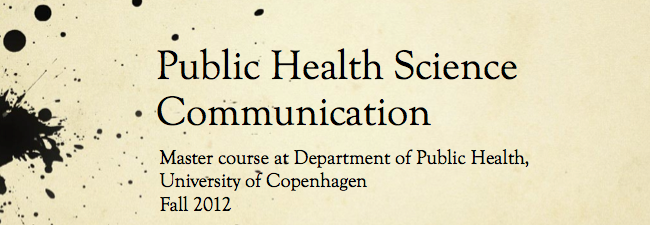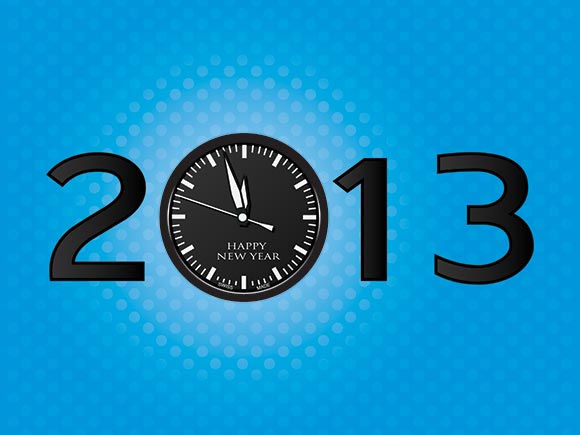On my list of things to do writing a blog post about my experiences with teaching Public Health Science Communication to graduate students at the University of Copenhagen has been high-up for a while. However, moving to Bonn, Germany and other minor things have somehow managed to overrule the writing of this post. But its time – also to avoid the experiences being stored too far back in my mind to be brought forward.
So how did it go? Did the students find it useful? What went well? Would I repeat a course like this again? And if so, what would I do differently? There are lots of questions to answer, so I thought I’d go through them one by one.
How did it go?
Overall, I think it went quite well. At least all students passed and it wasn’t criticized apart by the students. I’d even like to think that the students learned something new and useful. And just as important: I learned a lot! Both about science communication in relation to public health and about teaching public health science communication.
Did the students find the course useful?
It is very often difficult to get a clear impression of whether students found a course useful or not, and the fact that only few students filled in the online evaluation questionnaire and that only about half of the class attended the last module, where we did a short oral evaluation of the course, makes it even more difficult. However, based on the students who did participate in the evaluation I think it would be alright to conclude that the students on the whole were happy with the course. From the online evaluation most of them indicated that the study objectives of the course were met (and I assume they to some extend joined the course on the basis of these), and they rated their overall study-relevant benefit as ‘very good’ or ‘good’. I was also very happy to see that a most of the students who filled in the online evaluation found the course very relevant to their general Public Health education.
From the oral evaluation the comments were also in general positive. The students expressed that it had in many ways been a very different course, with much less hardcore theory than many of their other graduate courses. Some also mentioned that the fact that the centre of attention to a much higher degree than in other courses had been on themselves as individuals and researchers, had been interesting but at the same time a challenge. They expressed that they were more used to focus on the objective of Public Health, which is usually the public and not so much on their own role in this. I found this interesting, and recalling my own time as a Public Health student it is true that it was rarely about ourselves and our current and future roles in public health (one could talk about our subjective role), but much more about all the other players in public health, of course including the public itself.
 Another thing I found interesting, was that when asked about the syllabus, the students in general seemed happy with the selected literature, except many of them expressed that they found the blog posts too chatty and recommend them taken out in future courses. I myself had put a lot of thought into allowing different kinds of literature. In part to illustrate that science communication is not just about text books and peer-reviewed journals. I guess they as university student have by now just been a little brainwashed to prefer good old scholarly texts over the more ‘chatty’ and personal writing styles…
Another thing I found interesting, was that when asked about the syllabus, the students in general seemed happy with the selected literature, except many of them expressed that they found the blog posts too chatty and recommend them taken out in future courses. I myself had put a lot of thought into allowing different kinds of literature. In part to illustrate that science communication is not just about text books and peer-reviewed journals. I guess they as university student have by now just been a little brainwashed to prefer good old scholarly texts over the more ‘chatty’ and personal writing styles…
What went well?

 In my own opinion, many things went well. The balance between having myself as the main lecturer and having great guest lectures (thank you to them!) was good (I taught about half of the modules). It also worked well and was a good change to get out of the class room and go on field trips. One to Videnskab.dk, a Danish popular science news website, and to Medical Museion.
In my own opinion, many things went well. The balance between having myself as the main lecturer and having great guest lectures (thank you to them!) was good (I taught about half of the modules). It also worked well and was a good change to get out of the class room and go on field trips. One to Videnskab.dk, a Danish popular science news website, and to Medical Museion.
I’m happy also that I chose to make a compendium rather than assigning a textbook. Partly due to the fact that there isn’t yet a book out there on Public Health Science Communication, but also because it was good to be able to through different kinds of texts to illustrate the many forms of science communication.
Another things I found was successful was trying to use as many real life examples. Ranging from case studies (although it would have been nice to have more), to YouTube clips, podcasts, blogs etc.
Despite some worrying comments from some of the participants prior to finishing the exam, I also think that the task of writing an introductory chapter on Public Health Science Communication worked well. Some students expressed that they found that an exam more focused on actually trying to communicate a specific public health challenge would have been more appropriate and useful instead of what they regarded being an assignment to refer theory of science communication. I (of course) tend to disagree. Writing an introductory chapter on Public Health Science Communication is also an example of communicating a scientific field – it just happened to be a field (and a way of thinking) that was new to them.
What would I do differently?
It is funny what time does. Looking back at the course now, with some months having passed, I have a hard time recalling all the things I would have changed. Because at one point I thought there were many. However, some do come to mind:
I think I would have tried to include more real life examples of science communication – both good and bad examples, and perhaps have challenged the students to analyse both and suggest why they worked and why the didn’t.
Despite having the primary focus on the communicator (the public health professional) rather than looking at the receiver, I think I would in a future course try to incorporate a little more on how publics benefits from public health science communication, and perhaps try to allocate some more time to going through how one can become better at understanding and writing to a specific target group. This will present a different challenge, because the course is not a writing course.
Actually, I found the that finding a balance between being a course on principles, trends and theories in science communication and a writing, hands-on course quite difficult. I am sure that in a repetition of the course, this would again be a difficult balance to get right.
It’s always difficult to get students to discuss, but in a future course I’d try to make room for more discussion and student involvement. My own take-home message from teaching this course, is that I should keep in mind, that science communication is not an exact science and that I, despite being the teacher, does not have all the answers…
Would I repeat a course like this again?
Yes, I think I would. For many reasons. One, I thought it was fun and inspiring to teach. Second, I was confirmed in my belief that introducing public health students to the importance of science communication is very much relevant – if not essential. And finally, I learned a lot from the process and I would love to see how a version 2.0 of the course would go about.
Did I forget to mention something important in the post? Probably – but I promise to add them (or do an additional post) if and when things come to mind. I also welcome my students to share their views and correct me if I’m wrong, and I would be happy to answer questions from anyone interested in hearing more of my experiences with teaching Public Health Science Communication.


